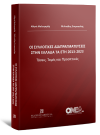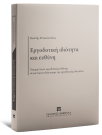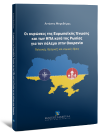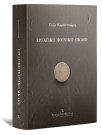Α.-Μ. Κώνστα, Working time law in Japan and the European Union, 2003

This book deals with working time and legal culture in Japan and the European Union. Working time is perceived in an extended approach, in relation to non-working time, or lifetime of the employees. Thus, the examination of working time regulation is not limited merely to hours of work, but it also includes regulation regarding leaves, night work, part-time work and subsequently sex equality law.
A different overall approach of comparative law methodology is presented. The concept of legal culture assists comparative law methodology, since it allows the comparison of two legal systems, which would seem hard to compare according to traditional comparative law standards. Moreover, the study of legal culture both in Japan and in the European Union allows us to read behind the lines of the relevant legal texts and examine not only formal law, but also what working time Law is or should be in relation to the respective social contexts. In this respect, the function of working time law is revealed and the task of reforming working time law is facilitated.
The aim of this research is to trace down a common denominator between Japan and the European Union, which would promote a mutual comprehension and would facilitate a possible collaboration in the process of re-conceiving working time law. It represents a new approach to comparative law methodology, and it is useful for research in comparative law and politics, legal sociology, European and Japanese social law.
Το βιβλίο αυτό αποτελεί μία συγκριτική μελέτη του δικαίου του χρόνου εργασίας στην Ευρωπαϊκή Ένωση και την Ιαπωνία. Ο χρόνος εργασίας προσεγγίζεται διευρυμένα και η έρευνα δεν περιορίζεται μόνο στις ώρες εργασίας αλλά επίσης αφορά και το «χρόνο μη εργασίας» ή το «χρόνο ζωής». Ο χρόνος δεν αντιμετωπίζεται στα πλαίσια αυτά αποσπασματικά αλλά στην ολότητά του. Η έννοια του νομικού πολιτισμού έχει ένα διττό ρόλο. Από τη μία πλευρά χρησιμοποιείται έτσι ώστε να αναλυθεί η έννοια του χρόνου εργασίας και από την άλλη χρησιμοποιείται ως μεθοδολογικό εργαλείο του συγκριτικού δικαίου.
Ο νομικός πολιτισμός εφαρμόζεται στο δίκαιο του χρόνου εργασίας τόσο στην Ευρωπαϊκή Ένωση όσο και στην Ιαπωνία. Προτείνεται ένας νέος ορισμός του νομικού πολιτισμού που συσχετίζει τη χρήση του όρου αυτού με την συγκριτική έρευνα. Προάγεται, έτσι, σε μεθοδολογικό εργαλείο του συγκριτικού δικαίου που μας επιτρέπει να εξετάσουμε - πέρα από τους νόμους, τη λειτουργία τους, την ουσιαστική εφαρμογή τους - εναλλακτικές ή και άτυπες μεθόδους διευθέτησης των διαφορών.
Ο τελικός στόχος της μελέτης δεν είναι απλώς να συγκρίνει το δίκαιο του χρόνου εργασίας στην Ευρωπαϊκή Ένωση και στην Ιαπωνία, αλλά να επιτύχει τη βαθύτερη κατανόηση των δύο δικαίων μέσω μίας πολιτισμικής προσέγγισης αυτών των στοιχείων, των αντίστοιχων νομικών ρυθμίσεων που θα συμβάλλουν στο μέλλον σε μία «νέα αντίληψη» για το δίκαιο του χρόνου εργασίας και το εργατικό δίκαιο γενικότερα. Το βιβλίο αυτό αποτελεί χρήσιμο εγχειρίδιο για έρευνα στα πλαίσια του συγκριτικού δικαίου, της κοινωνιολογίας του δικαίου, του Ευρωπαϊκού κοινωνικού δικαίου και του Ιαπωνικού εργατικού δικαίου.
Edition info
Table of contents +-
INTRODUCTION
CHAPTER
The Changing Use of Working Time
CHAPTER
The Concept of Legal Culture
A. Searching for the Appropriate Definition
B. Legal Culture as a Tool of Comparative Legal Research
CHAPTER
Working Time Regulation in the European Union
A. Working Time in Europe: A Brief Historical Perspective
B. The European Union Legal Framework on Working Time
C. Working Time and the Principle of Equal Treatment
D. The Treaty Of Amsterdam: A New European Social Model?
CHAPTER
Working Time Regulation in Japan
A. A Brief Historical Overview
B. The Japanese Legal Framework on Working Time
C. What About Equal Treatment in Japan?
D. The New Amendments
CHAPTER
The Legal Culture of the European Union Working Time Regulation
A. The European Idea of Law
B. Applying Legal Culture to Selected Subcategories of European Union Working Time Legislation
a. The Working Time Directive
b. The Two Euro-agreements
CHAPTER
The Legal Culture of the Japanese Working Time Regulation
A. The Idea of Law in Japan
B. Applying Legal Culture to Selected Subcategories of Japanese Working Time Legislation
CONCLUSIONS
BIBLIOGRAPHY





















